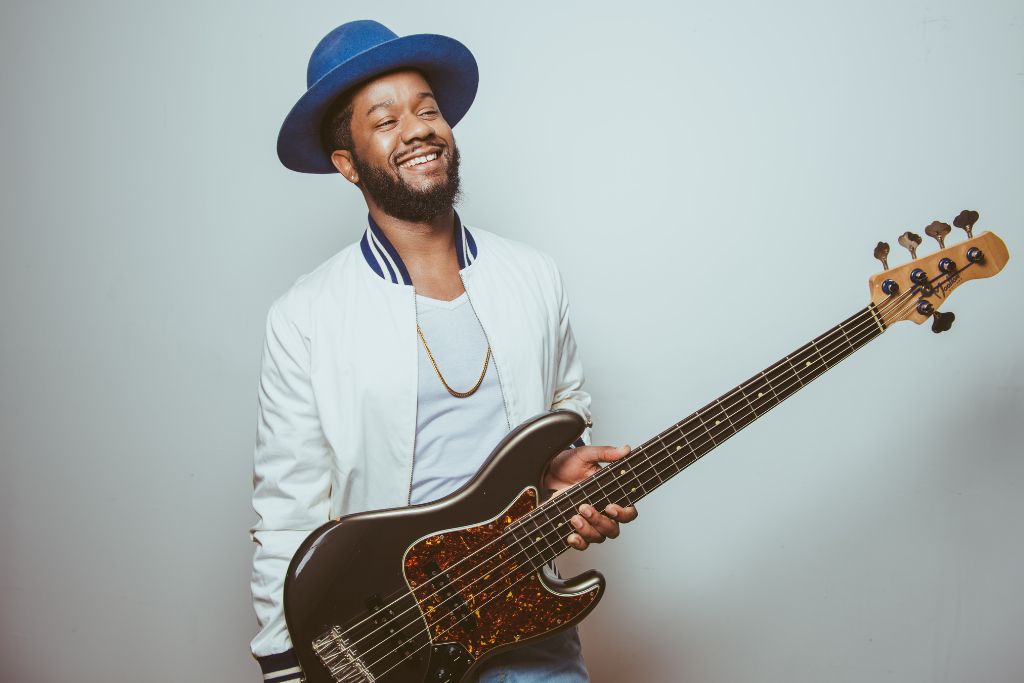
Ben Williams’ artistry continues to blossom, wondrously. Ever since hitting the international jazz scene in the late-aughts as a bassist for the likes of vibraphonist Stefon Harris, pianist Jacky Terrasson, and saxophonist Marcus Strickland, Williams has made ineradicable footprints in the expansive music world as top-tier sideman; commanding solo-artist, composer, and bandleader; and more recently as an increasingly sought-after producer.
The greater jazz world first took notice of Williams’ superb command of the bass in 2009 when he won the 2009 Thelonious Monk Institute of Jazz International Bass Competition. In addition to receiving $20,000 toward college-level music scholarship, Williams won a recording contract with Concord Records with which he recorded his first two solo albums – State of the Art (2011) and Coming of Age (2015). Williams’ first two albums exemplified the crackling energy of 21st century straight-ahead jazz as musicians of his generation continued incorporating modern soul, alternative pop, and subtle shades of hip-hop into a post-bop framework. His debut album received a 4 ½ star review in Down Beat magazine and reached #1 on the iTunes and Billboard charts. In 2011 iTunes named him “breakthrough artist of the year” in the jazz category.
He was also featured in Concord Records’ all-star ensemble, Next Collective on its 2013 album, Cover Art. That combo showcased Williams anchoring an incredible combo that included guitarist Matthew Stevens, drummer Jamire Williams, trumpeter Christian aTunde Adjuah, pianists Kris Bowers and Gerald Clayton; and saxophonists Logan Richardson and Water Smith III. Cover Art illustrated the ensemble’s affinity for music outside the traditional jazz canon as it delivered imaginative makeovers of tunes by D’Angelo, Pearl Jam, Stereolab, Little Dragon, Drake, Kayne West, Bon Iver, Meshell Ndgeocello, Jay Z., Dido, and N*E*R*D.
For the remainder of the decade, Williams’ career ascended as an in-demand bassist. He recorded and toured with a litany of titans that include guitarists Pat Metheny and George Benson; singers Dianne Reeves, Carmen Lundy, Jazzmeia Horn, Lauryn Hill, Maxwell, and José James; saxophonists David Sanborn, Dick Oatts, Jacques Schwarz-Bart, and Sadao Watanabe; and pianists Robert Glasper and Eric Reed; trumpeters Wynton Marsalis and Nicholas Payton, and violinist Regina Carter.
In 2013, Williams won a Grammy with Pat Metheny’s Unity Band for “Best Jazz Instrumental Album,” in 2017, he received a “Congressional Jazz Innovator Award” from the late Congressman John Conyers, and in DownBeat magazine’s Critics Poll, he was named “Rising Star Bassist” in 2013 and 2015.
On Williams’ 2020 third album, I Am a Man (Rainbow Blonde), he revealed tremendous growth as an exploratory, socio-political artist. He shifted his focus from straight-ahead jazz to 21st century R&B as he led a cast of scintillating artists that included trumpeter Keyon Harrold, singer Kendra Foster, flutist Anne Drummond, and drummer Justin Brown. Williams also showcased his vocal chops and songwriter gifts on such engrossing songs such as “March On,” “Take It Home” and “Promised Land.” Two years after that album’s release, DownBeat magazine’s Critics’ Poll listed Williams as “Rising Star Vocalist.”
Williams’ love for sophisticated modern R&B revealed itself again with his latest product, Butterfly Black, a charismatic duo with singer and songwriter Syndee Winters. Together Williams and Winters extended the rich R&B legacy of male-female duo acts such as Ike & Tina Turner, Ashford & Simpson, René & Angela, Peaches & Herb, and Yarborough & Peoples. Butterfly Black has released a few intoxicating singles – “I Just Want to Love You,” “Lifetime,” and “Reaction.” The duo plans on releasing its debut EP in spring of 2023.
Williams is also producing albums for other emerging artists such as singer Jackie “Bouvier” Copeland, and pianist and composer Farren Mahjoor. Williams that his stints as a sideman bassist for so many artists gives him an advantage as producer.
As Williams advances as a producer, he says it’s like “learning music again.” “I’m developing a brand new relationship with music,” he explains. “Being a producer makes me enjoy music more, because I get to enjoy it from so many different perspectives. My career now feels like there’s more of a balance of those perspectives. For instance, when I play bass, I think like a composer. But when I’m producing music, I think like a bassist.”
Williams grew up in Washington, D.C., a city with a rich music legacy that stretches from gospel jazz, R&B, go-go and hip-hop to punk and alternative rock. The city has a history of producing music game-changers such as Duke Ellington, Chuck Brown, Marvin Gaye, Shirley Horn, Roberta Flack, Bad Brains, Meshell Ndgeocello, Wale, and Oddisee. Undoubtedly, Williams has earned the worldwide acclaim to be listed among those icons.
After graduating from the Duke Ellington School of the Arts, Williams studied with bassist Rodney Whitaker, while attending Michigan State University. He earned his Bachelor of Arts degree in jazz music at Julliard. Williams lived in New York for 14 years, developing his reputation as a versatile and virtuosic bassist.
In 2021, he relocated to Los Angeles, a city that he says gives him more space to focus on his art. Now more than 10 years since he dropped his debut album, Williams says he can listen to early music with refreshened ears.
“I’ve just come to that point of revisiting my early albums,” Williams says. “It now feels safe to look back. Moving forward has always been important to me. I always want to make sure that I’m progressing and not standing still artistically. You can’t run forward and constantly be looking backwards at the same time. But I think I’m far away from those early albums, where I can listen to them now and appreciate where I was artistically then. Sometimes, I can even be inspired by my earlier albums.”
In addition to continuously evolving as multi-instrumentalist, composer, singer, and producer, Williams is working on a bio documentary on life that will touch upon how the roles of the church, social activism, politics, and his supportive family impacts his professional and personal life.